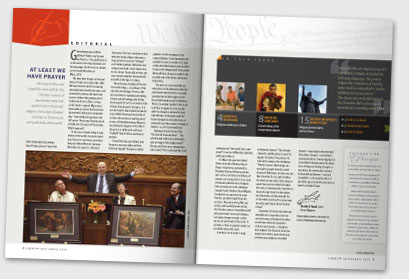At Least We Have Prayer
Lincoln E. Steed July/August 2010Götterdämmerung or Morte d’Arthur? Pardon my German and French—the significance is in the works of art they represent, not the languages. But first let me remark on the incredible events of May 6, 2010.

We have been living in a financial house of cards since September 2008. We have become used to increasing unemployment, foreclosure signs, and shuttered businesses. We have even come to believe that gyrating stock markets work in our favor, so long as the trend is upward. May 6 was a great wake-up call, as the Dow Jones plummeted 1,000 points during that day—eventually closing down only 347 points. Proctor and Gamble stocks actually lost 37 percent of their value. What happened?
To be sure, no leader today is truly master of the world’s economic trajectory. But some must know more than they say. Federal Reserve Chairman Bernanke is an expert in the Great Depression. He must surely know that after the initial collapse there was a long period of economic “sitzkreig” and market gyrations before the real collapse took hold. I don’t blame him for his silence. Financially, at least, we must wonder whether the world will end with a whimper or a bang.
We are being reminded of the limits to technology—or perhaps of the risks from technology. There is, after all, some fear of runaway auto trading. Science and technology, which have become gods of sorts to a modern state of logic, have begun to betray us. It is not too hard to hear behind the fearful hush of Wall Street and the bubble of oil from the sea floor a swelling chord or two of Götterdämmerung, Wagner’s opera based on legends of the fall of the gods in a battle with evil forces. “Twilight” time for life as we know it, perhaps.
Famed Victorian poet Alfred, Lord Tennyson, was very taken with the Arthurian legends that gave a mythic grandeur to the emergence of an imperial Britain. (I well remember the parallel moment in modern U.S. leadership when Washington was Camelot. Or was it the Reagan era?) In his poem Morte d’Arthur, Tennyson spoke to the possible end of the heroic ruler and a holy nation.
The poem is concerned with just a few hours in the afternoon after the great battle that left Arthur mortally wounded and all the knights of the Round Table dead except Sir Bedivere. There is an elegiac quality to the verse as Arthur struggles to come to grips with the change in national fortune and attempts to link again with the forces that gave him Excalibur (a constitution?) and the promise of refuge in Avalon—a sort of promised land.
Bedivere laments the fact that “the true old times are dead . . . The whole round table is dissolved which was an image of the mighty world.” He sees only “new men, strange faces, other minds.” This is precisely the mood sweeping over “the world’s last superpower” as we are buffeted by calamities within and without.
On May 6 this year the United States observed a National Day of Prayer. It had been proclaimed by President Obama, following statute and custom, but almost in defiance of a lower court ruling that it is an unconstitutional establishment of religion. One can easily see in the challenge brought by the Freedom From Religion Foundation an opportunistic sense that this president might forgo the occasion. They were wrong! We may not be, and hopefully never will be, the Christian nation of mandated creed and government-structured religion; but a day of prayer reminds us that we are not quite lords of the earth. It reminds us that our greatest needs can be salved only by the Spirit.
It reminds me of Arthur’s reply to Bedivere’s lament. “The old order changeth, yielding place to new,” he agreed. His advice? The advice of a ruler all too aware of his limitations. “Pray for my soul. More things are wrought by prayer than this world dreams of. Wherefore, let thy voice rise like a fountain for me night and day. For what are men better than sheep or goats that nourish a blind life within the brain, if, knowing God, they lift not hands of prayer both for themselves and those who call them friend? For so the whole round earth is every way bound by gold chains about the feet of God.”
Separation of church and state was intended and is important. But I do not think many of America’s founders would have wanted a separation of church and society—a freedom from religion. The Supreme Court has many times tried to parse the history of what even presidents stumbled toward—especially as they declared these days of prayer—and called it ceremonial deism. It works legally, but I am afraid it misrepresents the intent of such things as the day of prayer. It should not be ceremonial; it should be heartfelt and diverse—and not compelled or structured by rulers. It should be open to all who raise voice or hand to a Higher Power.
Article Author: Lincoln E. Steed
Lincoln E. Steed is the editor of Liberty magazine, a 200,000 circulation religious liberty journal which is distributed to political leaders, judiciary, lawyers and other thought leaders in North America. He is additionally the host of the weekly 3ABN television show "The Liberty Insider," and the radio program "Lifequest Liberty."